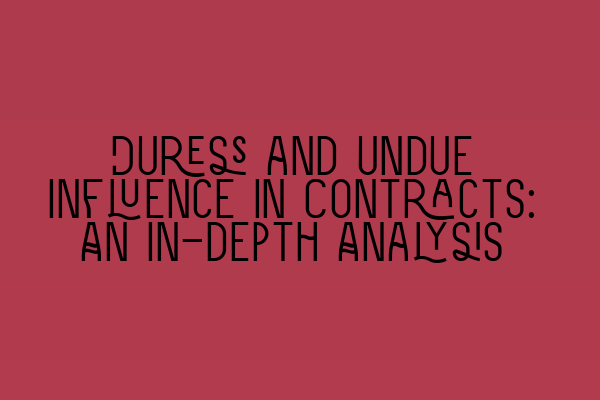Duress and Undue Influence in Contracts: An In-depth Analysis
Introduction:
Contracts are an integral part of our daily lives, governing various transactions we engage in. They provide legal certainty and protect the rights and obligations of all parties involved. However, there are instances where contracts may be entered into under duress or undue influence, compromising the voluntary and genuine consent of one party. In this article, we will explore the concepts of duress and undue influence in contracts, their implications, and the legal remedies available.
Understanding Duress in Contracts:
Duress refers to the use of pressure or threats to coerce a party into entering into a contract against their will. This coercion can come in various forms, such as physical violence, economic threats, blackmail, or even psychological manipulation. When duress is present, the affected party’s consent is vitiated, rendering the contract voidable.
To better comprehend the concept of duress, let’s take a hypothetical example: Alice, a small business owner, is approached by Bob, a supplier, who threatens to stop the supply of critical materials unless Alice signs a contract at highly unfavorable terms. Fearing the potential harm to her business, Alice reluctantly signs the contract under duress.
In such a scenario, Alice has the option to seek legal remedies to invalidate the contract due to the presence of duress. By doing so, she can protect her rights and restore the balance of power in the contractual relationship.
Understanding Undue Influence in Contracts:
Undue influence, on the other hand, occurs when one party takes advantage of their dominant position or relationship with the other party to exert undue persuasion or control over their decision-making process. The dominant party manipulates the weaker party to enter into a contract that primarily benefits the former.
To illustrate this concept, imagine Mark, an elderly individual with limited cognitive abilities, being heavily influenced by his caregiver, Sarah, to sign a will leaving all his assets to her. Sarah manipulates Mark’s vulnerability and dependency for her own benefit, exploiting his lack of understanding or capacity to resist. In this scenario, Mark can argue that the will was executed under undue influence.
Proving duress or undue influence:
Establishing the presence of duress or undue influence requires substantial evidence. To effectively challenge a contract based on duress, the affected party must demonstrate that the duress was substantive, meaning that the threat or coercion was significant enough to cause them to enter into the contract against their own volition. In the case of undue influence, the affected party must show that they were under the dominant party’s control and lacked the free will to make an independent decision.
Legal Remedies and Consequences:
When a contract is invalidated due to duress or undue influence, the affected party may be entitled to various legal remedies. These may include rescission of the contract, where the parties are returned to their pre-contractual positions, or damages to compensate for any losses suffered as a result of the contract.
It is important to note that the consequences of duress and undue influence can vary depending on the jurisdiction and the specific circumstances of each case. Seeking legal advice from a qualified contract law solicitor is vital to understanding the available remedies and formulating the best course of action.
Conclusion:
Duress and undue influence are severe issues that undermine the foundational principles of contract law: free will and genuine consent. It is essential to recognize the signs of duress and undue influence in contracts, and to take appropriate legal action to protect one’s rights. For anyone affected by such circumstances, seeking professional legal guidance can provide the necessary support to challenge the validity of a contract and pursue the appropriate legal remedies.
Related Articles:
– SQE 1 Practice Exam Questions
– SQE 1 Practice Mocks FLK1 FLK2
– SQE 2 Preparation Courses
– SQE 1 Preparation Courses
– SRA SQE Exam Dates
